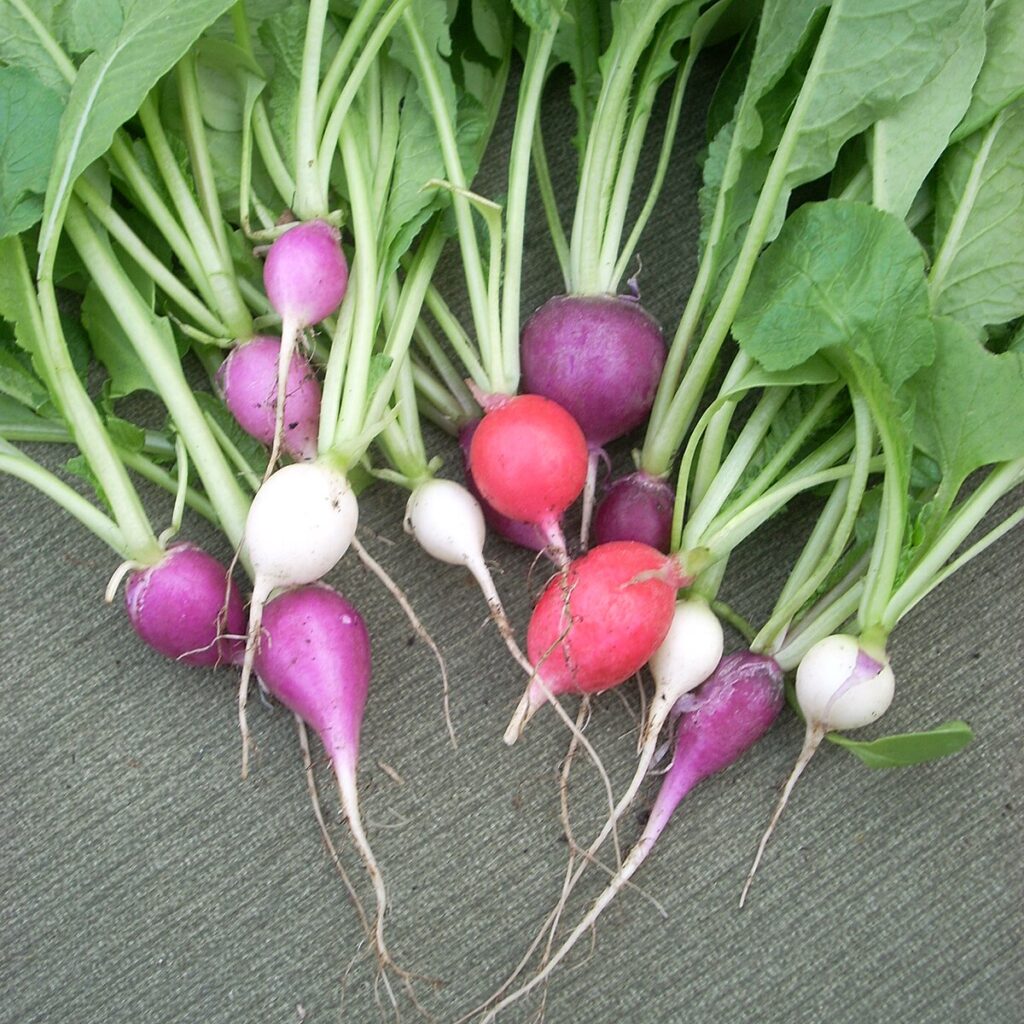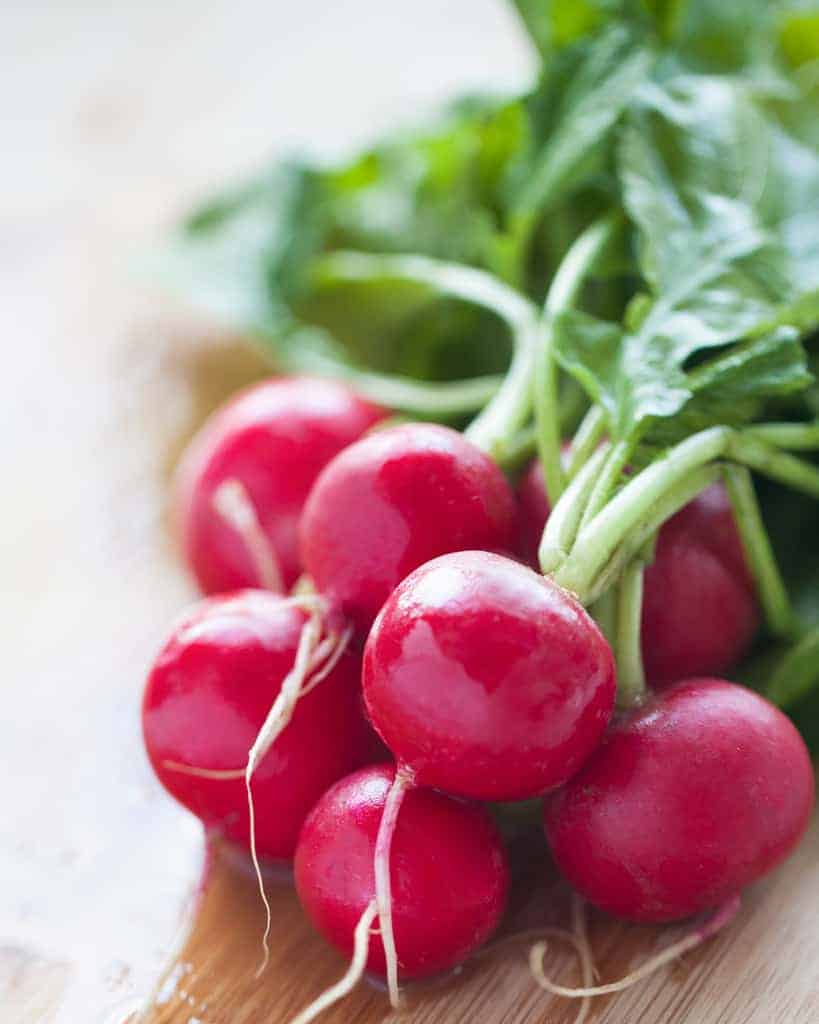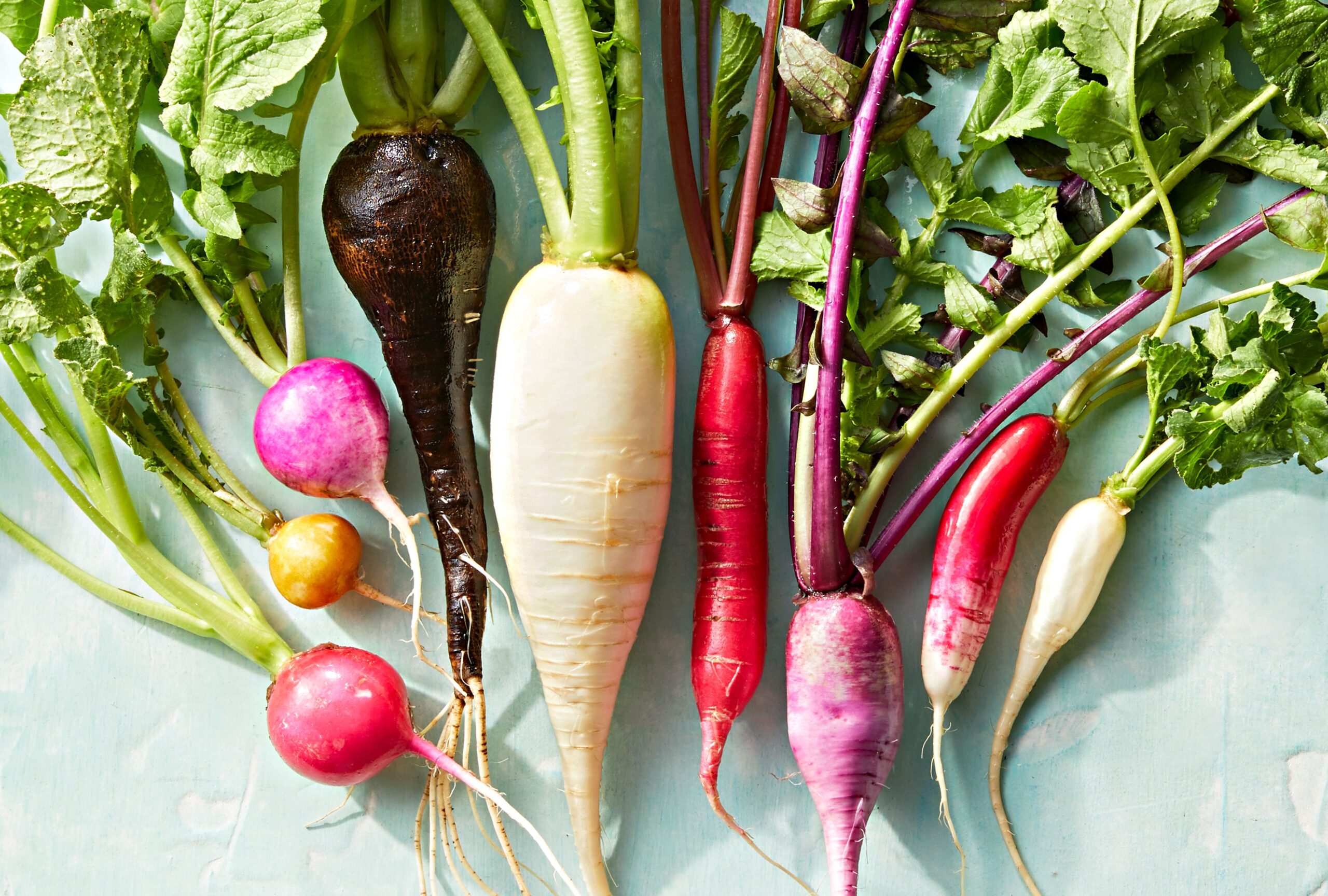Introduction:
The extraordinary medicinal benefits of radishes make them an important gift of the winter season. Radishes, readily available and inexpensive, come with exceptional health benefits. Essentially, they are the roots of a plant, commonly used as a vegetable and in salads. Nowadays, in Punjab’s cities, radishes are prominently displayed in markets, where they are sold with black salt and lemon sprinkled on their leaves.
According to medical experts, consuming radishes in their raw form is the best. However, radish dishes, parathas, and various pickles are also acknowledged for their deliciousness and health benefits. Nutritionists state that 100 grams of radish contain 18 calories, 6% dietary fiber, 2% calcium, 36% vitamin C, and 4% magnesium. Additionally, radishes contain phosphorus, iron, potassium, sodium, folic acid, and other compounds.

Impact and Varieties:
Radishes have a warming effect, which is why they should be consumed regularly by patients with asthma and respiratory issues during the cold season. They are generally 10 to 20 centimeters long and 3 to 7 centimeters wide. Radishes come in two types: one with long white roots and the other with round roots, often with red or black skin. Tender, delicate, long, and less fibrous radishes are considered the best. Radishes are mostly produced in the winter season, although in some mountainous regions, they are grown all year round. Differences in soil composition also affect their taste.
Radish leaves directly contribute to protection against diseases and strengthen the body’s organs. The native land of radishes is considered to be Central Asia. It was cultivated in ancient Egypt and Greece as well. However, now it is grown in almost all countries of Asia and Africa.
Health Benefits:
Radish leaves are also cooked and consumed as greens. According to experts, radishes are beneficial for patients with kidney stones. Consuming radishes as salad helps those suffering from kidney stones dissolve them, eventually flushing them out of the body. Drinking half a cup of radish juice daily can also provide relief from leucorrhoea. Boiling radish leaves, adding sugar, and drinking them helps in curing jaundice quickly.
Radishes are an excellent remedy for liver and spleen disorders. Weak bladder patients also benefit from its consumption, experiencing relief within a few days and strengthening the bladder. Due to its mineral richness, radishes are extremely beneficial for the liver, stomach, and overall energy levels. Radishes are also highly beneficial for cleansing the blood and reducing the deficiency of red blood cells in the body.
Consuming radishes, especially as salad, twice a day helps alleviate stomach ailments, particularly constipation. Its use improves intestinal function and the digestive system. Radishes are rich in potassium, which helps control the amount of potassium and sodium in the blood, maintaining balanced blood pressure. Regular consumption also leads to weight loss in overweight individuals. Obese individuals should drink radish juice mixed with lemon and black salt. This aids in reducing excess weight.
Radishes contain folic acid and vitamin C, boosting the body’s defenses against cancer. Applying radish juice to the affected area provides relief from swelling and pain caused by insect bites. Patients with hemorrhoids find relief by consuming radish-leafy vegetables. Radish is also helpful for indigestion or sour burps during meals. Mixing Egyptian milk and a little salt in a cup of radish juice relieves indigestion and sour burps.

To relieve stomach pain, mix a pinch of salt and black pepper in radish juice and drink it. If the throat feels sore due to coughing, mix a spoonful of fresh radish juice with equal parts honey and a little salt, and give it to the patient. Use this remedy three times a day. Insha’Allah, relief will come soon. Similarly, applying radish juice with warm oil helps to relieve ear pain.
Radish seeds provide relief from herpes or eczema without any ointment. Mixing 35 grams of radish seeds with vinegar makes the desired ointment. This ointment should be applied to the white spots of herpes. Those affected by asthma or respiratory problems should consume raw radishes regularly. Radishes reduce chest congestion and make breathing easier due to the ingredients present in them.
| Aspect | Description |
|---|---|
| Health Benefits | Radishes are rich in vitamin C, fiber, and antioxidants. They aid in digestion and detoxification, promote heart health, and boost immunity. Radishes also contain potassium, calcium, and magnesium. |
| Daily Uses | Radishes can be consumed raw in salads, sandwiches, or as a crunchy snack. They can also be pickled, cooked in soups, stews, or stir-fries, and used as a garnish. |
| Protein Content | While radishes are not a significant source of protein, they contain small amounts, contributing to overall protein intake in the diet. |
| Availability for Women | Radishes are widely available in grocery stores, supermarkets, and farmers’ markets, making them easily accessible to women for inclusion in their diet. |
| Freshness | Fresh radishes should be firm, with smooth skin and vibrant color. Avoid radishes that are soft, wrinkled, or discolored. Store them in the refrigerator to maintain freshness. |
| Culinary Uses | Radishes add crunch and flavor to salads, sandwiches, and tacos. They can also be grated into coleslaw, sliced into vegetable platters, or blended into smoothies for a refreshing twist. |
| Nutritional Value | Radishes are low in calories and fat but high in fiber, vitamins, and minerals. They provide essential nutrients while being low in sodium and cholesterol. |
Conclusion:
In conclusion, radishes are not just ordinary vegetables but storehouses of numerous medicinal properties. Their regular consumption can significantly improve health and alleviate various ailments. From respiratory issues to digestive problems, radishes offer a natural and effective solution. Embracing radishes in our diet can lead to a healthier and more vibrant life.
FAQs (Frequently Asked Questions):
Can radishes be consumed by diabetic patients?
Yes, radishes are low in calories and contain dietary fiber, making them suitable for diabetic patients. However, it is advisable to consult a healthcare professional for personalized dietary recommendations.
Are there any side effects of consuming radishes excessively?
While radishes offer numerous health benefits, excessive consumption may lead to digestive discomfort or allergic reactions in some individuals. It is best to consume them in moderation as part of a balanced diet.
Can radish juice be consumed by children?
Yes, radish juice can be given to children in small quantities, but it is important to dilute it with water and monitor their tolerance. Excessive consumption may cause discomfort, so moderation is key.
Are there any specific varieties of radishes recommended for medicinal purposes?
Tender, less fibrous radishes with a mild flavor are considered ideal for medicinal purposes. Varieties such as daikon radish and red radish are commonly used for their health benefits.
Can radishes be grown at home?
Yes, radishes can be easily grown at home in pots or garden beds. They require well-drained soil and regular watering for optimal growth. Homegrown radishes are fresh and free from pesticides, offering maximum health benefits.


Leave A Comment